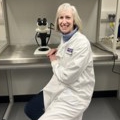
At the forefront of groundbreaking cardiovascular research.
The Manchester British Heart Foundation Centre of Research Excellence (CRE) advances cardiovascular research by driving interdisciplinary collaboration to tackle cardiovascular disease.
We focus on innovative strategies for prevention, diagnosis, treatment, and care, with an emphasis on combining cutting-edge technology and clinical expertise to deliver high-impact and translational discoveries.
We integrate world-class researchers across cardiovascular science, data science and AI. This enables us to foster groundbreaking research in areas such as cardiovascular genomics, heart failure, and inflammatory drivers of disease.
The CRE benefits from strong collaborations with Manchester’s health innovation ecosystem. We aim to inspire the next generation of researchers, empower career development, and create a sustainable future for cardiovascular research with a focus on diverse, equitable, and inclusive research practices.
On this page:
Themes
Explore our key research areas.
Find out how we are tackling pressing challenges, innovating new solutions, and driving progress for a better future for heart health.
Opportunities
Are you passionate about cardiovascular research? Join our team.
The CRE provides diverse career and training opportunities, including PhD studentships, research fellowships, and senior academic roles for cardiovascular scientists.
We offer a dynamic research environment with access to advanced facilities, collaborative projects, and support from leading experts in cardiovascular science. Opportunities are available for early-career researchers, including PhD studentships, post-doctoral positions, and transitional fellowships, providing pathways for personal and professional development. Researchers will benefit from interdisciplinary collaborations and access to cutting-edge technologies to drive impactful research.
For mid to senior-level researchers, there are leadership opportunities to guide multi-disciplinary teams and contribute to innovative research within the cardiovascular field. We foster an inclusive, supportive community where mentorship, professional growth, and diversity are highly prioritised. Our close partnership with NHS institutions, industry collaborators, and the global research network further enhances career opportunities, enabling impactful and translational research.
Interested candidates can explore current openings and positions through The University of Manchester job portal. We encourage those looking for an inspiring career in cardiovascular science to join us in advancing research that transforms patient care and health outcomes.
Current opportunities
Research team
Find out more about our dedicated researchers.
Our researchers are a group of passionate experts dedicated to advancing cardiovascular knowledge, and solving real-world heart health challenges through innovative research and collaboration.

Professor of Cardiovascular Medicine.
Bernard Keavney leads discovery genetics and functional genomic research in congenital heart disease (CHD), supported by his BHF Personal Chair, Programme Grant, MRC, and NIHR Manchester BRC Cardiovascular Theme.
His highly cited work in CHD genetics and epidemiology spans a decade. He fosters cross-disciplinary collaborations in CHD, focusing on genetic analysis in large datasets and delivering clinically relevant insights from electronic health records.
As Chair of the Governance Board, he oversees Transitional Fellows and liaises with stakeholders. Bernard has a strong leadership and mentorship record, especially for underrepresented groups in academia.

Professor of Cardiovascular Medicine and consultant at Manchester University NHS Foundation Trust.
Maciej Tomaszewski is a Professor of Cardiovascular Medicine and consultant at Manchester University NHS Foundation Trust. His research uses multi-omics strategies to translate genome-wide association study findings into genes, molecules, and pathways linked to blood pressure, chronic kidney disease, and other polygenic traits.
As Deputy Director, he will support day-to-day oversight of all Themes and drive collaborative initiatives with stakeholders, including NHS and industry. Maciej is committed to nurturing the next generation of cardiovascular researchers locally and globally.

Reader in the Division of Evolution, Infection, and Genomics at the School of Biological Sciences.
Kathryn Hentges is a Reader in the Division of Evolution, Infection, and Genomics at the School of Biological Sciences. Her research focuses on identifying genetic factors in mammalian cardiac development to better understand congenital heart defects and improve genetic diagnosis.
Kathryn will oversee the Theme, fostering collaborations and mentoring staff. She has extensive leadership experience in education, managing large-scale student programmes and research projects. A mentor in the Manchester Gold and WISE programs, she was awarded Postgraduate Supervisor of the Year in 2021 for her support of underrepresented researchers.

Professor of Molecular Cardiovascular Sciences.
Delvac Oceandy is a Professor of Molecular Cardiovascular Sciences at The University of Manchester. His research focuses on the molecular aspects of heart failure and novel methods to control adverse cardiac remodelling. He is also involved in clinical studies on cardiovascular risk management in rural Indonesia using SMART Health.
Supported by BHF, MRC, and HRUK, Delvac will coordinate the Heart Failure Theme, provide mentorship, and contribute to its strategic development. His molecular lab specialises in in vitro and in vivo cardiac modelling, gene transfer, and gene targeting technologies to support Centre researchers.

Professor of Cardiovascular Medicine, NIHR Advanced Fellow and Honorary Consultant.
Chris Miller is Professor of Cardiovascular Medicine, NIHR Senior Advanced Fellow, and Director of the BHF Manchester Centre for Heart and Lung Magnetic Resonance Research. He leads the HFpEF Theme of the NIHR-BHF Cardiovascular Partnership and founded UK HFpEF, a national resource supporting research across 50 UK sites.
Chris has a proven record in translational research and will guide the Heart Failure Theme alongside Delvac Oceandy to apply Manchester’s discovery science to patient benefit. He is an experienced mentor and leader of interdisciplinary teams, committed to supporting CRE PhD students, post-docs, and fellows.

Professor of Rheumatology, and Director of Experimental Medicine at the Centre for Musculoskeletal Research.
Maya Buch is a NIHR Senior Investigator and leads the ‘Disease complexity and multimorbidity’ cluster and ‘Next Generation Therapeutics’ Theme of the Manchester NIHR BRC.
Her research focuses on cardiovascular pathology in immune-mediated inflammatory diseases (IMID) and personalised therapeutics of IMIDs. She is experienced in clinical trials and targeted therapies and undertakes complex observational research.
She employs a reverse translational approach, employing clinical and imaging tools to deeply phenotype clinical cohorts, thereby dissecting disease phenotypes and pathophysiological processes and tracking clinical responses and outcomes, and linking these to experimental studies to identify mechanistic and diagnostic biomarkers.
She is national lead of the recently awarded MRC- BHF CARDIO (vascular)IMID UK partnership, bringing together 29 centres to deliver experimental studies in IMID-CVD, is colead of the ‘Cardio-Inflammation’ Theme of the NIHR-BHF Cardiovascular Partnership and Chair of the NIHR-Versus Arthritis UK Musculoskeletal Translational Research Collaboration.
As co-lead of the IDCCD Theme, she will bring her expertise and inter-disciplinary strategic roles and opportunities to support innovative, collaborative and inclusive experimental research in the cardiovascular field.

Professor of Stroke Medicine at The university of Manchester and Manchester Centre for Clinical Neurosciences (MCCN).
Craig Smith's research is focused on infection, inflammation, immunity and cerebrovascular disease. He brings translational expertise in experimental medicine and clinical cohorts, blood immune biomarkers, data science, evidence synthesis and clinical trials.
As Co-Lead for the IDCCD Theme, he will provide strategic leadership for the development and delivery of the theme objectives. This will include the integration of the forward and reverse translational aspects of the theme workstreams, with a particular focus on equality and diversity, building capacity of early career researchers, external funding applications and expanding collaboration with industrial partners.

Professor of Data Science and Healthcare Improvement at the University of Cambridge, and Honorary Professor in Informatics, Imaging and Data Sciences at The University of Manchester.
Niels Peek (Co-Lead, Data Science Theme) is Professor of Data Science and Healthcare Improvement at the University of Cambridge, and Honorary Professor in Informatics, Imaging and Data Sciences at The University of Manchester. His background is in Computer Science and Artificial Intelligence, and his research focuses on translational data science for clinical risk prediction, personalised and precision medicine, patient safety, and multimorbidity.
Until December 2023 he was based at The University of Manchester, where he led the Christabel Pankhurst Institute for Health Technology Research and Innovation, a partnership of academic, healthcare, industry and public sector organisations that aims to accelerate the translation of new technologies into healthcare practice.

Professor of Data Science.
Evangelos Kontopantelis is an expert in computational statistics and machine learning, with a focus on health informatics, quality of care, inequalities, and intervention evaluation. His research includes meta-analysis, longitudinal data, electronic health records, spatial epidemiology, and machine learning.
Evan will link the BHF CRE with various health and research organizations, including NIHR Applied Research Collaboration Greater Manchester and the Christie NHS Foundation Trust. He also leads a team of ten researchers, actively supporting the CRE’s workstreams.

Bicentennial Turing Chair in Computational Medicine, RAEng Chair in Emerging Technologies, and Turing Fellow at The University of Manchester.
Alejandro Frangi is the Bicentennial Turing Chair in Computational Medicine, RAEng Chair in Emerging Technologies, and Turing Fellow at The University of Manchester. He advises OLS and MHRA on AI and non-animal regulatory evidence and founded the InSilicoUK Pro-Innovation Regulations Network. His research focuses on medical image analysis, machine learning, and computational physiology models.
As Co-Lead of the CMSL Theme, Alex will provide strategic leadership, ensuring integration with the Data Science Theme, promoting equality and diversity, supporting early career researchers, and expanding collaborations with industry.

Professor in the School of Computer Science at The University of Manchester and an Alan Turing Institute Fellow.
Sophia Ananiadou is Professor in the School of Computer Science at The University of Manchester and an Alan Turing Institute Fellow. She is a pioneer in biomedical Natural Language Processing (NLP) and founder of the UK National Centre for Text Mining (NaCTeM). Her research bridges biomedicine and NLP, enabling applications in personalised medicine, drug discovery, and disease prediction.
Under her leadership, NaCTeM became a sustainable centre providing tools for translational research. Her expertise in LLMs will be applied across the BHF CRE in collaboration with discovery and clinical scientists.

Professor of Computational Engineering and Flow Physics
Alistair Revell is currently Head of Department of Mechanical and Aerospace Engineering and also leads the Modelling and Simulation Centre, which is a research-industry interface representing the work of 30 academic staff focused on the development of open-source software; primarily computational fluid dynamics and structural mechanics.
His research focuses on three main areas: turbulence modelling and simulation (internal and external flows), fluid-structure interaction (moving and deformable structures) and the development of approaches for rapid analysis of complex flows (particularly via GPU hardware).
Previous work relevant to the CRE includes the analysis of turbulent blood flow in the larger vessels, assessment of aneurysm rupture risk and pre-surgery evaluation and intervention planning of congenital heart disease.

Chair in Neuroinflammation, Division of Neuroscience.
David Brough is an expert on mechanisms of inflammation, and in particular on the regulation of inflammasomes and interleukin-1 family cytokines.
Inflammasomes are multimolecular protein complexes that form in inflammatory cells in response to pathogen and damage associated stresses and catalyse the activation of proinflammatory cytokines. David’s work has delivered new insights into fundamental inflammatory mechanisms and has established their contribution to driving disease pathology in a range of conditions.
David has also developed a number of unique tools and reagents for dissecting and characterising inflammatory pathways. David’s research spans cell/molecular/chemical biology and through collaborations through to preclinical and clinical research.

Professor of Molecular Cardiology
Xin Wang's laboratory has been investigating a range of focus areas, all of which centre on understanding the molecular mechanisms of heart failure and its complications, with a recent focus on heart failure with preserved ejection fraction (HFpEF) and hypertrophic cardiomyopathy (HCM).
Her recent key objective is to gain a deeper insight into stress signalling regulation of cellular homeostasis and energy metabolism as well as fatty acid regulation in obese and hypertensive conditions. In doing so, Xin Wang aims to find new avenues for potential treatment strategies, including the identification of novel druggable targets and early biomarkers.
Her contribution to CRE comprises three tasks:
1) Discovery study to understand pathological mechanism underlying HFpEF, focusing on ER stress-instigated lipid dysregulation and systemic inflammation.
2) Translational study to develop new treatment strategies involving ER-targeted Pak activators and IRE RNasese modulators as well as autophagy facilitators.
3) Screening exosome-contained miRNAs as potential biomarkers for early-stage metabolic HFpEF.

Professor of Translational Genomic Medicine
Bill is Professor of Translational Genomic Medicine at The University of Manchester and a Consultant in Clinical Genetics at the Manchester Centre for Genomic Medicine, Manchester University NHS Foundation Trust.
He leads a cardiac genetics clinic and, with Profs Bart Loeys and Johan Saenen (University of Antwerp), he leads the European Society of Human Genetics Training Course in Cardiac Genetics.
His research focuses on the discovery and characterisation of rare genomic disorders. He has led the discovery of over 25 rare conditions. He is the co-lead of the Manchester BRC Rare Conditions theme.
He has an active research program in the implementation of pharmacogenomics in clinical practice and is the lead of the NHSE Network of Excellence in Pharmacogenomics and Medicines Optimisation. He is the current President of the European Society of Human Genetics.

Professor of Neuroscience
Stuart Allan’s research expertise is in understanding the contribution of inflammation to neurological disease, principally stroke and vascular dementia. He and colleagues first identified the cytokine interleukin-1 (IL-1) as a key mediator of neuronal injury and promising therapeutic target in stroke.
His on-going translational research combines preclinical and clinical studies, with the overall aim of discovering new treatments that can improve patient’s lives. Current projects are focused on inflammatory processes in the acute phase of ischaemic stroke, developing therapies for both ischaemic stroke and intracerebral haemorrhage, and understanding how immune/inflammatory changes contribute to post-stroke cognitive decline.
He is Co-Director of the Geoffrey Jefferson Brain Research Centre.

Professor of Cardiology
Professor Mamas trained in Medicine at the University of Oxford, completing his clinical training in 2000. He is a Professor of Cardiology at Keele University and is a practicing interventional cardiologist with a special interest in intracoronary imaging.
Professor Mamas is a member of the AHA CLCD Cardiovascular interventions Science committee and a Board member of ESC CardioOncology council. He is the lead of the British Cardiovascular Intervention Society National Registry and is responsible for national PCI reporting. He serves as an Associate Editor of Circulation: Cardiovascular Interventions and is the senior clinical editor of TCTMD.
Professor Mamas is the Clinical Director of the Centre for Prognosis Research at Keele University. He leads a group of clinicians, data scientists and statisticians whose research interests focuses around the use of routinely collected electronic healthcare data to inform the diagnosis, treatment and clinical outcomes of real-world patients with cardiovascular disease.
He has published over 1000 peer-reviewed manuscripts, cited over 56,000 times using big data in populations with cardiovascular disease, with a particular interest in studying CV outcomes in patients with cancer and has a h-index of 96.
Contact us
Like to know more? Get in touch.
For enquiries about the Manchester British Heart Foundation Centre of Research Excellence, please email us at bhfcre@manchester.ac.uk.





